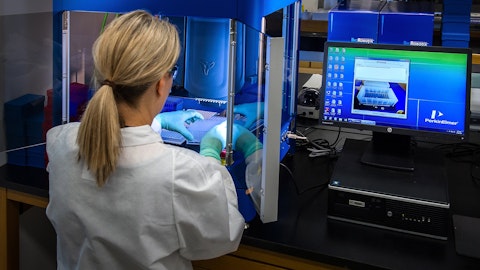Jan De Witte: Yes, so it’s the second part of your question, Ryan. These are products that are not applied in the VLU and the DFU area. So, it’s almost by definition that they are not on the list, and it does not impact any of our current business or potential.
Ryan Zimmerman: Oh, okay. And then Lea, on margins, I think Robbie was trying to get at this, but I recognize the full year margins are going down. And sequentially, they’re holding steady. What’s driving the second half step-up in margins though, if there is one? Because it can still – I mean, it can still step up in the second half from some improvement, but still be down year-on-year. And so, I’m just trying to understand with PriMatrix and Omnigraft removed – or SurgiMend and PriMatrix removed, excuse me, what allows you to drive that step-up in margins? And the flip side of it is, how are you managing your costs from Acclarent acquisition? Just help us understand kind of some of these moving parts a little further.
Lea Knight: Yes. So, Ryan, again, from a full-year basis, right, we’ll be down moderately. So, there is a little bit of a step-up required in the second half, but not significant. And a lot of that has to do with Skin being back at meeting full demand. We will see an improvement in margins. That’s a high margin product for us. So, that’s a key contributing factor. And then from an Acclarent – I think the other part of your question was on Acclarent. As, as I mentioned, we still expect that business to be EPS-neutral in 2024 for us, and that’s reflected in the guide as well. And overall, that portfolio, again, if we just talk gross margins, that portfolio is in and around our kind of base business gross margins. So, that’s not having a factor per se.
Operator: Thank you. One moment for our next question. And that will come from the line of Joanne Wuensch with Citi. Your line is open.
Joanne Wuensch: Good morning. Thank you for taking the questions. I have two. When you start reporting Acclarent, will that be called out as a separate subdivision under neuro, or where will that be tucked into?
Lea Knight: Yes. So, as part of our disaggregated revenues, we will see a separate segment for Acclarent or for ENT. I should say specifically ENT.
Joanne Wuensch: Okay. So, that’ll be called out separately. And where are you – I’m sorry, what?
Lea Knight: As ENT, as a category of ENT.
Joanne Wuensch: Thank you. And where are you in terms of a CEO search?
Lea Knight: Yes. So, the board remains on track with our original plans to identify, as well as hire a new CEO by year-end, if not sooner. So, that is progressing.
Operator: Thank you. One moment for our next question, and that will come from the line of Richard Newitter with Truist. Your line is open.
Richard Newitter: Hi, thanks for taking the questions. Maybe just first, are you comfortable with consensus including Boston contribution in 2025?
Richard Newitter:
Lea Knight: Are we comfortable with consensus including what contribution, Boston?
Richard Newitter: Boston Restart. Incremental contribution from a Boston restart. I guess right now, there’s that contemplation. Appreciate you’ve guided to 2024, but just to level-set. I mean, is this something that we should just take out of 2025 or the first half of 2025? Anything you can comment on there so that numbers can get right.
Lea Knight: Right. Yes, I understand the question. Unfortunately, we are not providing guidance with respect to 2025. As Jan mentioned. our work is ongoing to digest fully the findings coming out of the most recent audit to determine what the appropriate timeline is to bring back SurgiMend and PriMatrix. So, we can’t provide more additional information beyond that other than the fact that we are committed to bringing those products back to the market.
Richard Newitter: Okay. And then just wondering, why are you so confident that Skin capacity will be back or fully back online in the second half? And then if I could just one more. Have you contemplated going down – not going down the PMA pathway with SurgiMend? And if not, would you be comfortable restarting the Boston facility if you chose not to go down that pathway?
Lea Knight: So, let me take the PMA question first because obtaining the SurgiMend PMA absolutely remains a key priority for us, and it is absolutely consistent with our IBBR strategy. We have not yet determined at this point whether or not the Boston timeline, if or how it will implicate the PMA timeline for SurgiMend. So, that piece is still out there, but what is absolutely clear is that the need for SurgiMend and IBBR, it has not diminished. And so, for us, that means our opportunities to capitalize remain robust in that space. I think your other part of your question was related to Skin and our assumptions in the back half. Again, because our production lines are up and running and we’re not – but we’re not at capacity, the work that we have underway has a plan that’ll allow us to get back to needing demand. And so, that’s what’s assumed in our guide.
Operator: Thank you. One moment for our next question. That will come from the line of Craig Bijou with Bank of America. Your line is open.
Craig Bijou: Good morning. Thanks for taking the questions. So, I want to start with Boston. I know you’ve gotten a lot of questions on it. I know you guys aren’t providing a ton of information here, but is there any way you can talk about if you’ve had discussions with the FDA or the external auditor that did the review? And I mean, I know you’re not providing what’s happening, but I think it’d be helpful to understand, at least from that perspective if you are working with the FDA at this point on moving forward.
Jan De Witte: So, look, like I said, I mean, there’s a little we can update further. Yes, definitely can’t speak on behalf of the FDA. We are working the plan, and that’s where we’re focused on at this point in time. But no further updates that we can give on Boston.



